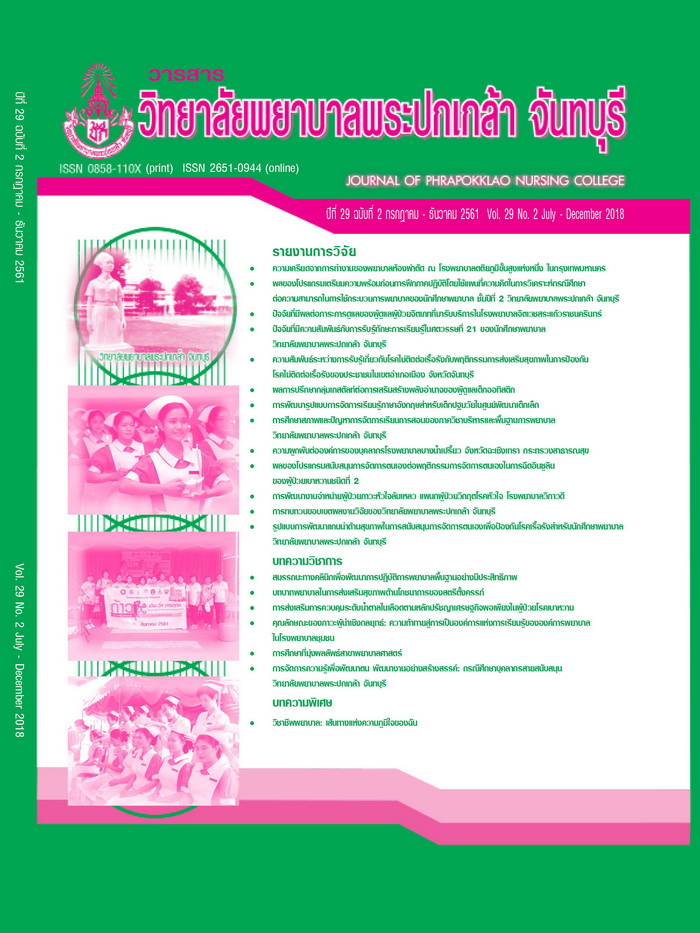Outcome-based Education in Nursing Science
Keywords:
Outcome-based education, Nursing scienceAbstract
Outcome-based education in bachelor of nursing science is a student-centered method of curriculum blueprint and teaching that focus on the accomplishment of the learning outcomes by nursing students. The learning outcomes in nursing education should derive from the results of analysis, the influencing factors having impact on the responsibilities of professional nurses. Moreover, learning outcomes should conform to national blueprint for change of higher education, national strategy plan in public health area. In the context of health care reform, learning outcomes should reflect the competencies of nursing students and need to consider how the nurse graduates responsibilities include health promotion, health prevention, cure, rehabilitation, and advocacy. The way to organize curriculum and instruction should set a goal for learner’s achieving according to learning outcomes that were determined in nursing curriculum. The important learning outcomes include nursing science knowledge and the related sciences, higher thinking skill, expected nursing competencies include nursing care practice, have a moral, interpersonal and communication skill, professionalism, and 21th century learning skill. Moreover, the learning and teaching methods have to align with the learning outcomes assessment that were planned and designed, and should determine timing for achieving the learning outcomes at each level of the course.
References
กระทรวงศึกษาธิการ. (2558). เกณฑ์มาตรฐานหลักสูตรระดับปริญญาตรี พ.ศ. 2558. สืบค้นจาก http://www.mua.go.th/users/bhes/front_home/criterion58/criterion_b58.PDF
กระทรวงศึกษาธิการ. (2560). ประกาศกระทรวงศึกษาธิการ: มาตรฐานคุณวุฒิระดับปริญญาตรี สาขาพยาบาลศาสตร์ พ.ศ. 2560. สืบค้นจาก http://www.mua.go.th/users/tqf-hed/news/data6/ประกาศ-ศธ-NQF-2560-พยาบาลศาสตร์-ป-ตรี.PDF
กองยุทธศาสตร์และแผนงาน กระทรวงสาธารณสุข. (2560). แผนยุทธศาสตร์ชาติ ด้านสาธารณสุข 20 ปี (ตุลาคม 2559-2579). สืบค้นจาก dccenter.ddc.moph.go.th/infoc/download/201706161497602904_Info_20_Y_plan_V4&18M_planV5pdf
สุเมธ แย้มนุ่น. (2560). บทบาทของสำนักงานตรวจประเมินภายใต้แผนอุดมศึกษา 20 ปี (2560-2579). สืบค้นจาก http://www.bme.mua.go.th/wp-content/uploads/2017/10/ME-in-20-yrs.pdf
American Association of Colleges of Nursing. (2008). The essentials of baccalaureate education for professional nursing practice. Washington, D.C.: Author. Retrieved from https://www.aacnnursing.org/Portals/42/AcademicNursing/Tool%20Kits/BaccEssToolkit.pdf
Eckleberry-Hunt, J., & Tucciarone, J. (2011). The challenges and opportunities of teaching “generation Y”. Journal of Graduate Medical Education, 3(4), 458-461.
Fan, J. Y., Wang, Y. H., Chao, L. F., Jane, S. W., & Hsu, L. L. (2015). Performance evaluation of nursing students following competency-based education. Nurse Education Today, 35(1), 97-103.
Frenk, J., Chen, L., Bhutta, Z. A., Cohen., J., Crisp., N., Evans., T., … Zurayk, H. (2010). Health professionals for a new century: Transforming education to strengthen health systems in an interdependent world. Lancet, 376(9756), 1923-1958.
Harden, R. M., Davis, M. H., & Crosby, J. R. (1997). The new Dundee medical curriculum: A whole that is greater than the sum of the parts. Medical Education, 31(4), 264-271.
Hsu, L. L., Pan, H. C., & Hsieh, S. I. (2016). Randomized comparison between objective-based lectures and outcome-based concept mapping for teaching neurological care to nursing students. Nurse Education Today, 37, 83-90.
Johanson, L. (2012). Teaching the millennial generation: Considerations for nurse educators. Nurse Educator, 37(4), 173-176. doi:10.1097/NNE.0b013e31825a875a
Keating, S. (2011). Curriculum development and evaluation in nursing. New York: Springer.
Kim, H. S. (2012). Outcomes-based curriculum development and student evaluation in nursing education. Journal of Korean Academy Nursing, 42(7), 917-927.
McCurry, M. K., & Martins, D. C. (2010). Teaching undergraduate nursing research: A comparison of traditional and innovative approaches for success with millennial learners. Journal of Nursing Education, 49(5), 276-279. doi:10.3928/01484834-20091217-02
McNeil, H. P., Hughes, C. S., Toohey, S. M., & Dowton, S. B. (2006). An innovative outcomes-based medical education, program built on adult learning principles. Medical Teacher, 28(6), 527-534.
Sessums, C. D. (2016). What is OBE?: Unboxing outcomes-based education. Retrieved from https://www.d2l.com/blog/what-is-obe/
Singh, M., & Ramya, K. R. (2011). Outcome based education. International Journal Nursing Education, 3(2), 87-91.
Spady, W. G. (1993). Outcome-based education. Canberra: Australian Curriculum Studies Association.
Spady, W. G. (1994). Outcome-based education: Critical issues and answers. Arlington, VA: American Association of School Administrators.
Wu, F., Wang, Y., Wu, Y., & Guo, M. (2014). Application of nursing core competency standard education in the training of nursing undergraduates. International Journal of Nursing Sciences, 1(4), 367-370.
Downloads
Published
How to Cite
Issue
Section
License
Copyright (c) 2018 JOURNAL OF PHRAPOKKLAO NURSING COLLEGE

This work is licensed under a Creative Commons Attribution-NonCommercial-NoDerivatives 4.0 International License.
เนื้อความ ข้อมูล และรายการอ้างอิงที่ผู้เขียนใช้ในการเขียนบทความเพื่อลงตีพิมพ์ในวารสารวิทยาลัยพยาบาลพระปกเกล้า จันทบุรี ถือเป็นความคิดเห็นและความรับผิดชอบของผู้เขียน คณะผู้จัดทำวารสารไม่จำเป็นต้องเห็นพ้องด้วยหรือร่วมรับผิดชอบ
บทความที่ได้รับการลงตีพิมพ์ในวารสารวิทยาลัยพยาบาลพระปกเกล้า จันทบุรี ถือเป็นลิขสิทธิ์ของวารสารวิทยาลัยพยาบาลพระปกเกล้า จันทบุรี หากหน่วยงานหรือบุคคลใดต้องการนำส่วนหนึ่งหรือทั้งหมดของบทความไปเผยแพร่ต่อเพื่อวัตถุประสงค์ใด ๆ จะต้องได้รับอนุญาตจากบรรณาธิการวารสารก่อน



